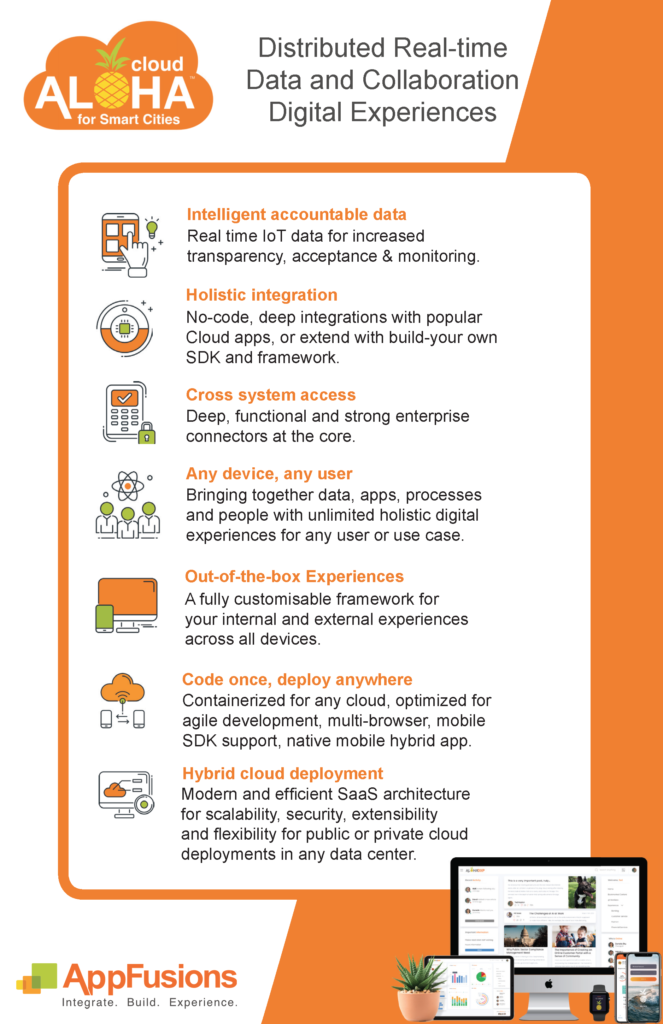As we enter the digital age, ‘smart cities’ provide a glimpse of the future. However, a big gap remains between the hype and the reality. Becoming a smart city is not a goal but a means to an end. The objective is to respond more effectively and dynamically to the current and future needs and desires of citizens. Technology is simply an enabler, a tool to optimise the infrastructure, resources, and spaces they share.
In order to create smart cities and regions, city leaders must leverage data and technology while also implementing programs that promote civic engagement to help make citizens’ lives better and boost economic development.
“Disruptive new technology in transport, communications and energy efficiency are becoming a reality—we will position our cities to take full advantage. We will leverage real time open data driven solutions and support investment in sectors commercialising new innovations to grow [the] economy.”
(Australian Smart Cities Plan 2016 – ISBN 978-1-925238-47-1)
The Problem
Already, more than half the world’s population lives in urban areas and this number is expected to increase to two thirds by 2050. With pressure increasing on public services and infrastructure, cities need to be looking for innovative ways to involve citizens in the development of services and experiences and deal with strategic challenges such as growth, innovation, social inclusion and safety.
The Solution
Every community needs to innovate how they work with data, engage employees/constituents and improve processes. For aspirational Smart Cities Initiatives needing visibility into the development of services and experiences within their city, AlohaCloud digital experiences platform is a new intuitive, self-service digital transformation solution, providing personalised end-user experiences to internal and external users. AlohaCloud puts real-time, transparent information into the hands of users to help them make better decisions and drastically reduces operational inefficiencies.
Introducing Digital Experiences for Smart Cities
In an ideal world, integrated digital experiences – for citizens, agencies, employees would just work – securely, seamlessly, functionally, and with delight. But they don’t.
Instead, most Smart Cities have a growing problem of too many systems and silos, redundant or overlapping tools and data, and compounding communication challenges because of the “systems of chaos”.
No Smart City is immune to this challenge – and all Smart City CIOs wish vendor to vendor systems worked better together.
Digital Experience Platforms enable, optimise, and grow mixed-systems digital experiences, communications and collaborations.
Such solutions put the end-user and their valuable time, first , bringing together dozens of platforms, both in the cloud and on-premise, modern and legacy.
Executive summary
- What is a smart city? A smart city uses IoT sensors and technology to connect components across a city to derive data and improve the lives of citizens and visitors.
- What does a smart city do? Oftentimes, a mobile app is provided to give immediate access to data, communication channels, and more so that people can do everything from avoiding traffic jams, to finding a parking spot, and reporting a pothole or an overflowing dumpster.
- Why do smart cities matter? The world is becoming more urbanized, and by 2050, more than 60% of the world’s population is expected to live in cities. Making these cities better places to live is essential to quality of life by making them more sustainable and efficient with streamlined services.
- Who do smart cities affect? It affects everyone on the planet.
- When are smart cities happening? This is happening now.
- Where are smart cities happening? Early adopters of smart city technology were European cities, but US cities have quickly picked up steam and are incorporating technology into municipal infrastructure.
- Who is making smart cities happen? Public and private companies, as well as federal, state, and city governments, are getting involved to make it easier for municipalities to adopt new technology. Private and public partnerships are becoming a smart way for cities to add technology.



